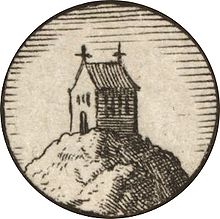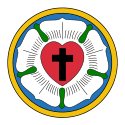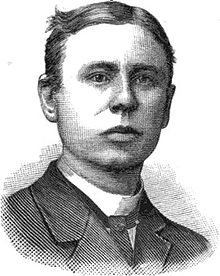- Confessional Lutheran
-
Confessional Lutheran is a name used by certain Lutheran Christians to designate themselves as those who accept the doctrines taught in the Book of Concord of 1580 (the Lutheran "confessional" documents) in their entirety, because they believe them to be completely faithful to the teachings of the Bible. While most Lutheran denominations find the basis of their faith in the Book of Concord, "Confessional Lutherans" maintain that faithfulness to it requires attention to how that faith is actually being preached, taught, and put into practice. Confessional Lutherans believe that this is a vital part of their identity as Lutherans.
While the term "Confessional Lutheran" is sometimes used to refer exclusively to the more conservative churches found in groupings such as the International Lutheran Council and the Confessional Evangelical Lutheran Conference, most churches of the larger Lutheran World Federation subscribe to the Book of Concord as an exposition of faith, albeit one which is subordinate to the Bible.[1]
Contents
History
Two main confessional movements arose during the 19th century: the Old Lutherans and the Neo-Lutherans.[1] The Old Lutherans originated from the Schism of the Old Lutherans, while Neo-Lutheranism arose in Germany in the 1830s from the Pietist driven Erweckung, or Awakening. Neo-Lutheranism itself contained differing camps. It gave rise later to those calling themselves confessional Lutherans.
Neo-Lutheranism developed in reaction to Pietism on the one side and Rationalism on the other, both of which had arisen in the previous century. German clergymen like Martin Stephan, C.F.W. Walther, F.C.D. Wyneken and Wilhelm Loehe became a part of the movement as they studied the works of Martin Luther and the Book of Concord.
The Old Lutheran and Neo-Lutheran movements spread to the United States with the Neo-Lutheran Wilhelm Loehe and the Old Lutheran free church leader Friedrich August Brünn[2] both sending missionaies to newly arrived German immigrants in the Midwest and the immigration of groups like the Saxons, who settled in Missouri under Martin Stephan and C.F.W. Walther, the Germans who settled in Indiana under F.C.D. Wyneken, and the Prussians under J.A.A. Grabau in Western New York and southeastern Wisconsin (the Buffalo Synod).
 …one holy Church is to continue forever. The Church is the congregation of saints, in which the Gospel is rightly taught and the Sacraments are rightly administered.—Augsburg Confession[3]
…one holy Church is to continue forever. The Church is the congregation of saints, in which the Gospel is rightly taught and the Sacraments are rightly administered.—Augsburg Confession[3]
Church bodies using the title "confessional"
Contemporary Lutheran church bodies that identify themselves as confessional tend to be either members of the International Lutheran Council, Confessional Evangelical Lutheran Conference, as well as some independent Lutheran bodies. Among the members of the ILC are the Lutheran Church—Missouri Synod, the Lutheran Church–Canada and the Independent Evangelical-Lutheran Church of Germany. Among the CELC are the Wisconsin Evangelical Lutheran Synod and the Evangelical Lutheran Synod. Other confessional Lutherans include the Church of the Lutheran Confession (CLC), the American Association of Lutheran Churches (AALC), the Concordia Lutheran Conference, the Evangelical Lutheran Diocese of North America (ELDoNA), member congregations of the Protes'tant Conference, member congregations of the Orthodox Lutheran Confessional Conference of Independent Congregations (OLCC),[4] member congregations of the United Lutheran Mission Association (ULMA)[5] and Evangelical Lutheran Conference & Ministerium of North America (ELCM)[6] (all of North America).
Though there are some churches in the Evangelical Lutheran Church of America which would call themselves "confessional," many of said churches have decided to leave the ELCA due to the liberal leanings of the denomination, most notably their stances expressed in the 2009 ELCA convention.[7] The ELCA as a whole does not use the title "confessional" to describe itself, but it and the other member churches of the Lutheran World Federation do ascribe to the unaltered Augsburg Confession and the other confessional documents in the Book of Concord as true interpretations of the Christian faith.[8]
In the Nordic countries, there are a few small churches that identify themselves as confessional Lutheran. These include the Concordia Lutheran Church and the Evangelical Lutheran Church in Sweden.
"Quia" versus "Quatenus" subscription
Lutheran church bodies and Lutheran individuals that identify themselves as confessional hold to a "quia" (Latin for "because") rather than a "quatenus" (Latin for "insofar as") subscription to the Book of Concord. Quia subscription (the Book of Concord is adhered to because it is faithful to the Scriptures) implies that the subscriber believes that there is no contradiction between the Book of Concord and the Scriptures. Quatenus subscription (the Book of Concord is adhered to insofar as it is faithful to the Scriptures) implies that the subscriber leaves room for the possibility that there might be a contradiction of the Scriptures in the Book of Concord in which case the subscriber would hold to the Scriptures against the Book of Concord.[9] Some Confessional Lutherans maintain that this distinguishes them from other ("mainline") Lutheran bodies and Lutherans, who, they believe, hold to a quatenus subscription.
Views on the Pope
Some confessional Lutheran church bodies, such as the Wisconsin Evangelical Lutheran Synod, the Evangelical Lutheran Synod and the Church of the Lutheran Confession teach that the Roman papacy or office of the pope is the Antichrist, including this article of faith as part of a quia rather than quatenus subscription to the Book of Concord.
Spectrum: conservative or liberal
As a practical matter, Lutheran organizations that identify themselves as confessional are generally more conservative in their views of the Scriptures and doctrine than groups that do not. Many self-identified Confessional Lutherans are adherents of the High Church Lutheran movement.
Many Confessional Lutherans rejected the Joint Declaration on the Doctrine of Justification which was backed by more moderate groups. The conservative dogmatician Franz Pieper described more liberal Lutherans as nominally subscribing but then just treating the Confessions as "a document lying in the Archives."
See also
- Lutheran Orthodoxy
- Pietism
- Evangelical catholic
- International Lutheran Council
- Confessional Evangelical Lutheran Conference
- Evangelical Lutheran Free Church (UAC)
- United Lutheran Mission Association (ULMA)
References
- ^ Nelson, E, Clifford (1980), The Lutherans in North America (Revised ed.), Minneapolis: Fortress Press, p. 509, http://books.google.com/books?id=q3xyPFA_8O0C&pg=PA509#v=onepage&q=&f=false.
- ^ "Brünn", Christian Cyclopedia, LCMS, http://www.lcms.org/ca/www/cyclopedia/02/display.asp?t1=b&word=BRUNN.FRIEDRICHAUGUST.
- ^ "Article 7, Of the Church", Augsburg Confession, Book of Concord, http://www.bookofconcord.org/augsburgconfession.php#article7.
- ^ OLCC, US, http://olcc.us/.
- ^ United Lutheran Mission, http://www.unitedlutheranmission.org/.
- ^ ELCM, http://www.elcm.org/.
- ^ What We Believe, ELCA, http://www.elca.org/What-We-Believe.aspx.
- ^ "Confession of Faith", Statements of Belief, http://www.elca.org/What-We-Believe/Statements-of-Belief/ELCA-Confession-of-Faith.aspx.
- ^ Confession Subscription, http://user.txcyber.com/~wd5iqr/tcl/conf_sub.htm.
Confessional Lutheran Revivals Awakening J.G. Hamann · Paul Henkel · Hans Nielsen Hauge · Haugeanism · Paavo Ruotsalainen · Finnish Awakening · Claus Harms · Lars Levi Læstadius · Laestadianism · Carl Olof Rosenius · N.F.S. Grundtvig · Friedrich TholuckOld Lutheran GermanySchism of the Old Lutherans · Background · J.G. Scheibel · Eduard Huschke · Henrik Steffens · H.E.F. Guericke · G.P.E. Huschke · Free churchesAustralia and Papua New GuineaUnited States of AmericaMartin Stephan · J.A.A. Grabau · Wilhelm Sihler · F.C.D. Wyneken · C. F. W. Walther · H.A. Preus · Synodical Conference of North AmericaNeo-Lutheran Repristination SchoolErlangen SchoolG.C.A. von Harless · J.W.F. Höfling · Gottfried Thomasius · J.C.K. von Hofmann · Franz Delitzsch · K.F.A. Kahnis · Theodosius Harnack · C.E. Luthardt · F.H.R. von Frank · Paul Althaus · Werner ElertA.F.C. Vilmar · F.J. Stahl · A.F.O. Münchmeyer · J.K.W. Löhe · Theodor Kliefoth · Heinrich Hansen · High Church Union of the Augsburg ConfessionPortal Categories:- Lutheran theology
- Christian theological movements
Wikimedia Foundation. 2010.


